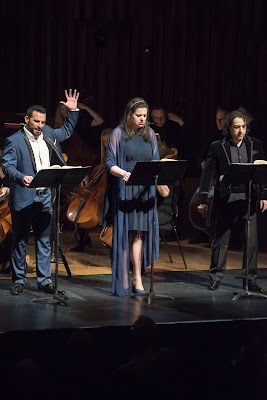 |
| Simone Alberghini & Maurizio Muraro with the BBC Symphony Orchestra, Opera Rara Chorus and conductor Daniele Rustioni_(c) Russell Duncan |
Reviewed by Ruth Hansford on May 11 2016
Star rating:
A rare outing for Bellini's first opera
 |
| Enea Scala, Daniela Barcellona & Rodion Pogossov (c) Russell Duncan |
For us, though, the main interest in this second Opera Rara / BBCSO collaboration (the first being Leoncavallo’s Zazà last autumn - see the review on this blog) was in spotting the many clues as to the direction Bellini’s short career was heading: those famous long spun-out vocal lines, and the gorgeous writing for woodwinds, were already much in evidence. He subsequently recycled some of the musical material such as the ‘heroine’ Nelly’s Act 1 aria that evolved Guilietta’s ‘O quante volte’ in I Capuleti e i Montecchi and the Act 2 duet for the eponymous Adelson and Salvini that was to foreshadow the Norma-Adalgisa showpiece.
Along with the elements for which Bellini is famous, there were also elements he didn’t pursue. This was dubbed an ‘opera semi-seria’ and there were some good gags: we had Bellini’s only buffo character the Neapolitan servant Bonifacio; we were offered the notion that the rivals for Nelly’s affections should solve the problem by cutting her in half, and of course for British audiences the Nelly / Fanny innuendo provided a smirk or two. On the whole, though, we are lucky Bellini subsequently found a better librettist in Felice Romani and stuck with the brooding Romanticism we love him for.
 |
| Kathryn Rudge, Leah Marian-Jones & David Soar (c) Russell Duncan |
Musically, there were some lovely moments. Daniele Rustioni led the BBC Symphony Orchestra in an energetic and characterful overture. The main characters had memorable arias: Bonifacio’s ‘Catalogue aria’ listing Salvini’s debtors, and Salvini’s aria with gorgeous cor anglais and clarinet accompaniment being high points; and there were some terrific set-piece ensembles. On the whole the men fared better, but the mezzos seemed to struggle with the low tessitura – even in spite of what I assume were judiciously added ornaments. The spoken dialogue proved problematic though. There was a lot of it, it was amplified and, though the Italians and Anglophones delivered it gamely, it didn’t really feel ‘lived’. The show was billed as a ‘concert staging’ but everything seemed to be performed to the first few rows of the stalls (or into the singers’ scores) – surprising when the concert had been sold out for ages beforehand.
I feel sure that the recording made earlier in the week for future broadcast on Radio 3 will capture the feel of the piece more successfully – assuming we want to listen to the music and don’t really care about the plot. And I am without a doubt not the only one who would be intrigued to hear it as originally intended, with an all-male cast…
Reviewed by Ruth Hansford
Bellini: Adelson e Salvini
Lord Adelson - Simone Alberghini
Nelly - Daniela Barcellona
Salvini - Enea Scala
Bonifacio - Maurizio Muraro
Colonel Struley - Rodion Pogossov
Madam Rivers - Leah-Marian Jones
Geronio - David Soar
Fanny - Kathryn Rudge
Daniele Rustioni - Conductor
Opera Rara Chorus
BBC Symphony Orchestra
Elsewhere on this blog:
- The power of five: Songs to the Moon from the Myrthen Ensemble - CD review
- The art is in putting people together: artistic director Douglas Boyd talks about Garsington Opera's new season - interview
- Firmly intent concentration on the music itself: Vox Luminis at the Cadogan Hall - concert review
- Strength, discipline & delicacy: Alexandra Dariescu, Fabien Gabel and RPO - concert review
- Adelina Patti, hurdy-gurdies & a Scots dance band: How to be HIP at Kings Place - feature article
- Beethoven, Dvorak & a constellation: Trio Celeste - CD review
- Strongly characterised: new music by Reiko Füting - CD review
- Intimate charm: Handel's Acis and Galatea - Concert review
- Impressive achievement, vibrant sound: Elgar's Symphony No. 1 from Trinity Laban Symphony Orchestra and members of WNO Orchesta, conductor George Jackson - concert review
- The delight of having both: Mendelssohn & Shakespeare's A Midsummer Night's Dream at Middle Temple Hall - theatre review
- Much to admire: ENO season launch - new article
- Finely sung: Folk song of the British Isles from the Armonico Consort - CD review
- Home









%20as%20Leporello%20and%20Erik%20Tofte%20(back%20to%20camera%20in%20garnet%20shirt)%20as%20Giovanni%20-%20Don%20Giovanni.jpg)

Given the disposition of vocal ranges, you wonder whether the original cast sang the female roles of Nelly and Fanny at high tenor pitch, which would certainly make the piece interesting. And also perhaps give it place in our catalogue of LGBT Opera (http://www.planethugill.com/2016/04/hidden-in-plain-sight-brief-survey-of.html)
ReplyDelete